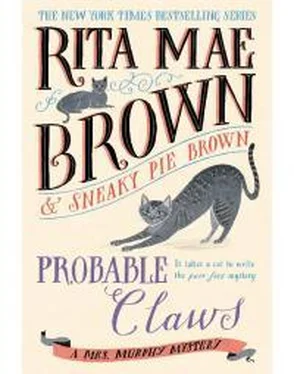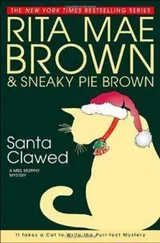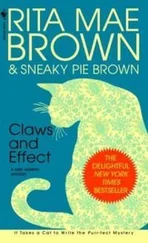
“No books on catnip,” Pewter, the gray cat, complained.
“Who would write about catnip?” the dog wondered.
“An herbalist,” Pewter replied. “Humans drink catnip tea. It’s a waste of good dried leaves but they do drink it. Catnip is meant to be chewed, inhaled, and then rolled in.” This was pronounced with authority.
Harry watched as customers picked up books, put some down, kept others. There was no accounting for taste.
“Even the post office parking lot is full. I was lucky. Just as I pulled in here a big SUV, big as in big as the state of Illinois, pulled out. Before I start browsing, did my order for Susan come in?”
“ Capability Brown. In,” Anne replied.
“Susan is getting as serious about gardening as she is about golf. Saw the book written by the Duchess of Rutland. Thought she’d like it.” Harry commented on one of her best friend’s deepening interest in gardening, and who better to write about it than an Englishwoman?
The English excelled at gardening. Rich, poor, in-between, they had the touch.
“The book is enormous. Lots of photographs, drawings.” Anne placed it on the counter.
“Give me a minute to cruise. I need to find some other gifts and nothing is better than a book.”
The door opened again.
Anne called out, “Lisa, your books are in.”
Lisa Roudabush, mid-thirties, medium height, was the director of the Albemarle County office of Nature First, a statewide environmental nonprofit. The headquarters was in Richmond but small offices were in every town with a university since the young were environmentally conscious.
Raynell Archer, Lisa’s assistant, began to turn the card cylinder looking for clever cards. They had walked into the store together, both lingering.
“Harry.” Lisa smiled. “Come to the office after you buy your books and I buy mine. Gary Gardner is almost finished and it’s a terrific design.”
Raynell, now looking at books displayed artfully on a table, added, “Harry, the walls run diagonally.”
“Do they?” Harry was curious.
“Well, I need to go to his office to pick a few last plans, approve more drawings, but we are nearly finished.” Lisa would be glad when the remodeling was over.
“He’s doing a workshed for me. It’s a gift from my husband. Isn’t Gary fun to work with?”
“He is.” Lisa looked out the large front windows, one of the best features of the store. “Are we ever going to see the sun again?”
“Spring,” Anne called from the counter. “And it’s supposed to start snowing again tomorrow and on Christmas. A white Christmas.”
“I tell myself winter can be beautiful but I never quite believe it.” Lisa walked to the counter where Anne had piled up her ordered books.
Lisa took the first one off the pile, a history of architecture in Richmond. Nature First, while primarily an environmental group, also regularly joined forces with other nonprofits to save historic buildings. The organization was also keen on the epochs before colonization, even before human life.
Lisa licked her forefinger to turn the page.
“My great-aunt used to do that.” Harry laughed.
“Are you telling me I’m an old lady? I’m younger than you,” Lisa fired back as she turned another page.
“Well, yes you are,” Harry replied, enjoying the exchange. “But I’ve only ever seen old people do that.”
Lisa motioned Harry over. “Look here. Pages always stick together. Licking my finger is easier than trying to slide my fingernail between pages or rubbing them together to pop them apart.” She demonstrated her thesis then said, “If I buy a book I have to leaf through it for a few pages, get a glimpse of it. Then I’ll read it later.”
Anne seconded this, adding, “Harry, your Mixed Role Productions calendars are here, too. You’re behind this year. Usually you order them in July.”
“July?” Raynell asked, having joined the others at the counter. “Why order a calendar in July?”
Harry replied, “They run August to August. And they’re eight and a quarter by five and a half inches so I can’t overlook them. See? Perfect size. If I order them in July they arrive in time for August.”
She removed shrink-wrap from the black-covered calendar with silver lettering that read 2017–2018, then demonstrated. “Big squares for each month, and then the days for the month are on lined pages, three days to a page. There’s a monthly financial record, too. A special occasions page is opposite the month at a glance. I got hooked. Here. Merry Christmas.”
“Harry, I can’t take your calendar,” Lisa demurred.
“I always order extras. You use it for a month and you’ll get hooked, too. And they aren’t expensive, which is the best part.”
Lisa took the light green–covered calendar offered her; they came in many colors. “Thank you.”
Harry examined Lisa’s books, read the titles on the spines. “Let’s see, Architecture in Richmond before 1800. Birding books and books on dinosaurs. Are you bringing them back? Nature First isn’t bringing them back, are you? Have you found some DNA?”
“Funny you should bring that up. I believe the day will come when that happens. Look at the uproar over that perfectly preserved mastodon,” Lisa replied.
“No need to dig. Those are in the Senate,” Harry kidded.
“If you only knew some of the people we have to work with in the House of Delegates. They don’t read. They deny what they don’t know. They love to exercise their little bit of power. You’d think they would at least read history and political theory. I always hope the level of intelligence is higher in Washington.”
“Oh, Lisa, I think the results speak for themselves.” Harry shrugged.
Raynell, close to Lisa’s age, piped up. “They deny climate change. They fail to realize how significant the architecture is in parts of Richmond. It’s maddening to work with such limited people. All they think about is their next election.”
“You’re right about that,” Lisa agreed as she closed the book about architecture. “There aren’t many really old buildings left since Richmond was burned in 1865. A few. They are so beautiful. The new stuff, not so much. But the scarcity means we must protect them, the detail alone on some of these structures is beautiful.”
“Marvella Lawson, the Virginia Museum of Fine Arts power, has promised to take me to look at some of the newer things, including those under construction,” Harry said.
“We fought the demolition of the Kushner Building,” Raynell said. “Didn’t do a bit of good. Big money. These tall buildings can interfere with nesting and the lights at night confuse migrating birds. Big money doesn’t care about anything but more profit.”
“Richmond doesn’t have a good development plan. Charlottesville is even worse.” Lisa sighed. “I’m beginning to think they hire the architect who will build the ugliest thing ever, like the giant pickle in London.”
“That is pretty awful,” Harry agreed. “I always think the English know better and now they are as bad as everyone else. Old London was so much prettier than New London.”
“Well, they’ve mucked up Philadelphia, too. That used to be such a unique environment. Now it looks like every other city.” Raynell’s voice carried a hint of venom.
“Are you from Philadelphia?” Harry asked.
“I went to Swarthmore.”
“Ah, good school.”
“Where did you go, Harry?” Raynell asked.
“Smith.”
That more or less settled the college discussion. It’s hard to beat one of the Seven Sisters. But Anne thought otherwise.
Читать дальше













